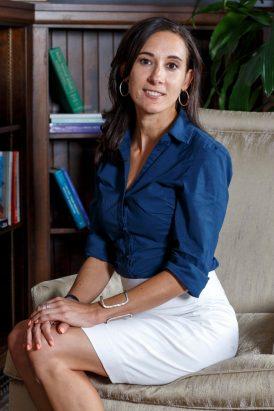One of the Pathways for Civic Engagement that was more important than ever this past year was Policy & Governance. During the Fall 2020 semester, amidst the Covid-19 pandemic and an unforgettable election season, Dr. Mara Ostfeld, Assistant Professor in Political Science, tapped into multiple Ginsberg Center resources—including matchmaking, course consultation, and preparing students for community engagement—to help bolster research work in her Detroit Votes course.
Ostfeld had previously taught the course with a focus on increasing voting participation in Latinx communities. For Fall 2020, she extended the research into the other “majority-minority” Metro Detroit communities, including Dearborn, which has a large ArabAmerican population and the largest Muslim population in the US per capita.
“There’s been a lot of research on how we increase voting participation, (but) a smaller body of that work that’s focused on historically marginalized communities,” Ostfeld says. “I really just wanted to delve further into that body of work and see what we can contribute.”
Using Ginsberg’s partner-centered matchmaking approach, Ostfeld connected with the Arab Community Center for Economic and Social Services (ACCESS), an opportunity she describes as “really helpful and meaningful” to her class’ research. A representative from ACCESS spoke with students about the history of the organization, its experience with community voter outreach, and effective messaging strategies for getting out the vote.
Teaching a community-engaged course in the time of Covid can be tricky, particularly when researching voter participation—a field of research that typically relies on door-todoor interviewing and face-to-face conversations with community members. The challenges of the pandemic forced Ostfeld’s class to pivot creatively to other forms of outreach, such as targeted mailers in different community languages with QR codes.
Though Ostfeld acknowledges that “everything is different” when it comes to community-engaged teaching right now, she notes that giving students the opportunity “to recognize and learn how frustrating and bumpy and messy the process is” has been an invaluable learning experience.
Ostfeld says that Ginsberg’s community-engaged learning support was crucial to connecting with partners and overcoming initial hurdles: “Getting more tools for approaching some of these subjects was really helpful to me.”

